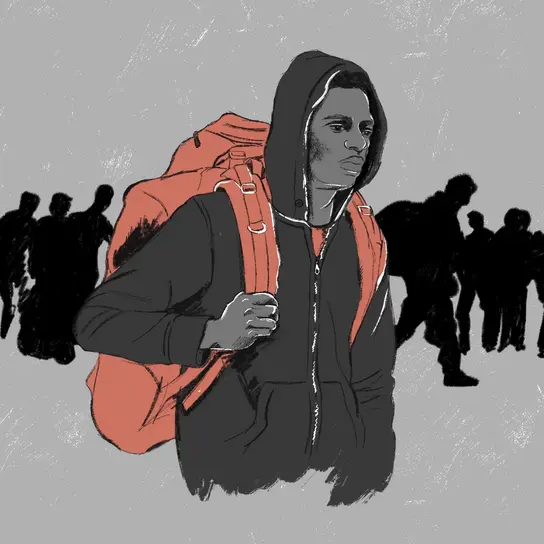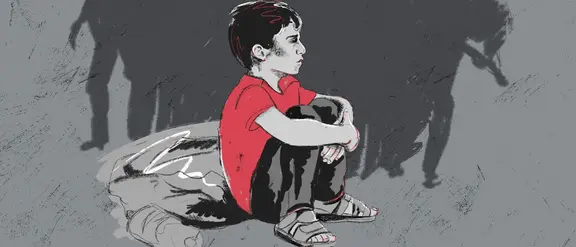Interview with four Afghan refugees
Many of the people from Afghanistan who came to Germany as teenagers have long since become part of society: They live here, study here, and are involved in socio-political issues. In this interview, four of them – Mahdie, Mostafa, Robina, and Parwana – talk about their experiences arriving in Germany and how they perceive the current debates about Afghanistan in Germany.
The four of you all fled Afghanistan or Iran as teenagers. How did you feel about having to leave your previous lives behind?
Robina: I came to Germany alone, without my family, without my parents. Being here alone was very hard. You've fled somewhere and suddenly you have to do everything yourself and you don't speak the language. The hardest part was that no one was waiting for me at home after school. I was completely alone. I had to take care of everything.
Parwana: My family told me back then that we would only be going to Iran for three months during the holidays. After that, we would return to Afghanistan. They knew I would never have accepted simply leaving my school and leaving forever. But my parents had to make this decision for all of us because my brothers were being threatened.

Mostafa: When I came to Germany in 2015, I was 15 years old and made the decision entirely on my own, without my parents' permission. They knew nothing about it. I would have had no future in Iran: as an Afghan, you're a second-class citizen there. Besides, I was always afraid of being deported back to Afghanistan. Ever since I was little, I'd always had an image of the Taliban in my head. I'd seen many videos, for example, of them killing people.
Mahdie: I was born and raised in Iran. My parents came there 30 years ago because of the war in Afghanistan. At the end of 2019, my mother, my little brother, and I fled Iran because the situation was unsafe for me and my family. When we finally arrived in Greece, we were taken to the Moria camp on Lesbos. The two years there were the worst time of my life: We lived in a tent, regardless of whether it was raining or very hot. There was no electricity, and sometimes we went days without water. And when we did have water, it was often undrinkable. It was dirty, loud, and dangerous, especially for women and children. We lived in constant fear. During that time, I felt forgotten. But the hope for a normal life somehow kept me going.
What was it like arriving in Germany for you?
Robina: After arriving in Berlin, I was sent to the accommodation in Tegel. I was only there for two or three days; I could barely sleep. I was the only girl, and I was so scared. I was in excruciating pain the whole time, which was psychological because I worried so much: In Afghanistan, I was a child—and suddenly I came to this country with a different language, full of rules and obligations. What was particularly awful about the bureaucracy for me was how the Senate Department and the Immigration Office treated me—even though I hadn't done anything wrong and had simply sought protection. After I received protected status, I wondered: Who will pay for these three years of pain? Who will apologize? Can they ever give me back the youth they took from me?
Mahdie: Yes, the bureaucracy was a huge challenge for me too. Two years after I arrived, I turned 18 and was supposed to have an interview with the Federal Office for Migration and Refugees. I was asked a lot of questions about Afghanistan. But I'd never actually been to Afghanistan myself… I learned to find my way step by step. In the beginning, it was very difficult to deal with the bureaucracy. I was quite young, after all. Back then, I hadn't really understood life yet; I was simply looking for security.
Mostafa: For me, the hardest part during the initial arrival period was living in a shelter for an extended time, with four people in one room. I often couldn't sleep and constantly wondered if coming here had really been worth it. I had lost everything: my country, my home, my family. At first, I didn't have any friends and couldn't go to school. It was incredibly boring; we were all depressed, which led to frequent arguments.
Parwana: One important thing for me is that I crossed the borders together with my family. I can't even imagine how dangerous it must be for children and young people to have to make this journey all alone.
Has the way people in Germany react to the fact that you come from Afghanistan changed in the last year – especially after the terrorist attacks by Afghan nationals and with the intensified deportation debates?
Mahdie: I think that Afghanistan is often only a topic of discussion in Germany when something bad happens. Many people in Germany don't even know how people live in Afghanistan or what we're going through. There's often a lack of empathy. I rarely feel truly heard when Afghans are being talked about. I wish for more genuine conversations where we can tell our stories. I wish our experiences would be taken more seriously and that we wouldn't just be seen as bad people.
Parwana: When I'm asked where I'm from and I say Afghanistan, the response is always: "Oh, the Taliban!" Or: "The girls aren't allowed to go to school, are they?" Once, I spoke at an event about the situation of refugees at the EU borders. Some of the questions from the audience were cruel, for example, about clothing or wearing a headscarf. They said: "You're not in Afghanistan anymore. There are no Taliban here. Why are you still wearing your headscarf?" That hurts.
Mostafa: I'm really disappointed with the German media. They don't talk about the terrible situation in Afghanistan. They only report on it when someone carries out an attack, and then suddenly all Afghans are condemned. What do the other Afghans who go to school here or are doing their vocational training have to do with it? The media paints a bad picture of the Afghan refugees who are here in Germany. We are not the Taliban. On the contrary: many of us fled from the Taliban.
Parwana: We not only need to talk more about Afghanistan in general, but we especially need to talk about the minorities and what is happening to them. For example, we need to talk more about the genocide against the Hazara. There is also a large LGBTQ+ community in Afghanistan that is persecuted. When we tell these stories as well, a different picture of Afghanistan emerges, one that many may not have seen before.
What do you think about the decisions made by German politicians regarding Afghanistan in recent years?
Robina: After the Taliban regained power, the SPD, the Greens, and the FDP decided that they wanted to bring a thousand people a month from Afghanistan to Germany through the federal resettlement program. But in total, very few people were actually taken in by Germany. Meanwhile, I witnessed people dying in Afghanistan. I saw women hiding. I saw prisoners being raped, tortured, and then murdered by the Taliban in their cells. But Germany always used bureaucracy as an excuse, saying, "We still need this document, and we need this, we need that." And now the program is even supposed to be stopped altogether.
Mostafa: Germany was deployed in Afghanistan for years, together with the USA. They bear a great responsibility. They brought great hope to Afghanistan – and then simply left the country. And now? Now Afghanistan has suddenly been forgotten. The country is only discussed when it comes to who can be deported. Nobody talks about the catastrophic human rights situation, the oppression of women in Afghanistan, and the poverty, hunger, and other important issues.
Robina: Germany says, "What the Taliban are doing in Afghanistan is wrong." And yet, the German government is making agreements with other countries to deport Afghans. Or they even want to cooperate directly with the Taliban. Germany has a criminal code: If someone commits a crime, they must be convicted—that applies to refugees, of course. But deporting people to Afghanistan violates human rights. It seems to me that in Germany, it simply doesn't matter if people in Afghanistan are facing death.
You read all these terrible news reports from Afghanistan, you hear from your friends there. How do you cope? And what motivates you to keep going?
Mostafa: I will never forget where I come from and why I'm here. That always motivates me. And that's why I keep striving. I want to achieve my goals here. I notice that, for example, at my school: I'm very ambitious there.
Parwana: I think I can be a bridge. Between European society and the people in Afghanistan. People here need this information – and the people in Afghanistan need to be heard. That motivates me to continue.
Robina: I don't feel German. But not entirely Afghan either. I live between two worlds now. It often hurts to hear the news from Afghanistan—and then to ask myself: What distinguishes me from an Afghan woman? What distinguishes me from a German woman? Women in Afghanistan also have rights. Why were they taken away from them? I tell myself: The Taliban know exactly how strong Afghan women are. They are fighting for their rights—and I believe that all women in the world carry this strength within them. That's why I want to give Afghan girls and women the feeling: You are not alone. We are fighting together.
Conversation partners
Mahdie is 20 years old, comes from an Afghan family, and was born in Iran. She has been living in Germany for three years, where she is currently attending upper secondary school. Besides school, Mahdie is deeply involved with languages and education. She is particularly committed to encouraging other young people who, like her, have recently arrived in Germany.
Robina is 24 years old. At 16, she fled Afghanistan for Germany without her family. She is now studying industrial engineering. Alongside her studies, Robina volunteers as a Young Advocate with Terre des Hommes to raise awareness of the difficult situation faced by people in Afghanistan. She is also active with the organization "Youth Without Borders" and works as a volunteer interpreter.
Parwana is 20 years old, an author and activist from Afghanistan. In Greek camps, she wrote books and started educational protests ("Build schools, not walls"). With the "Young Refugees Movement," she fights for refugee rights. Today, Parwana lives in Germany, attends high school, and continues to write. She says: "My words are my resistance."
Mostafa is 25 years old. He came to Germany when he was 15. After successfully completing his Abitur (university entrance qualification), he is currently training to be an automotive mechatronics technician specializing in systems and high-voltage technology.
